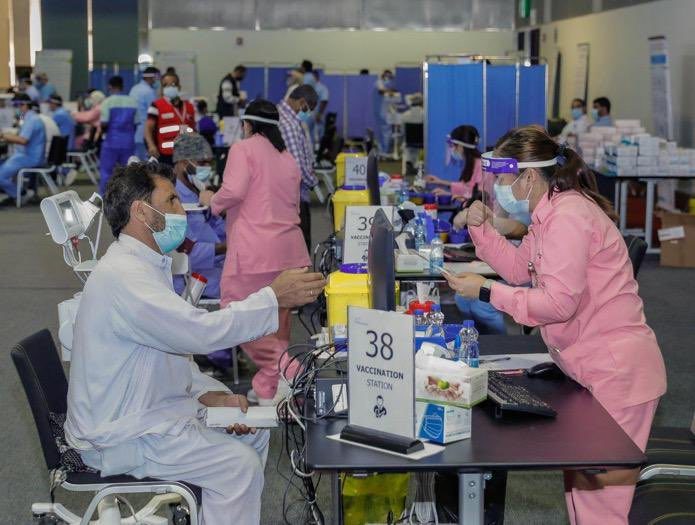The study on essential workers is one of the first to prove vaccines are strongly effective in fighting infections in real-life conditions.
The Pfizer-BioNTech and Moderna vaccines reduce the risk of infection by 80% after one dose and 90% following the second, according to a US federal study released on Monday.
The study was conducted by the Centers for Disease Control and Prevention and analysed nearly 4,000 health-care personnel, police, firefighters and other essential workers in eight locations around the US.
“The findings are consistent with clinical trial results and studies showing strong effectiveness in Israel and the United Kingdom, and in initial studies of health-care workers at the UT Southwestern Medical Center and in Southern California,” The Washington Post stated.
“The CDC report is significant, experts said, because it analysed how well the vaccines worked among a diverse group of front-line working-age adults whose jobs make them more likely to be exposed to the virus and to spread it,” it added.
🦠Concerns rise in #Qatar as a second Covid-19 wave targets more children, prompting authorities to consider imposing a temporary full lockdown to curb the spread of the virus. Read more 👇 https://t.co/TrgUYb9xYm @hmc_qatar
— Doha News (@dohanews) March 30, 2021
Doses were administered between December and March, during which some 3,000 people were being killed per day by a deadly winter surge.
“Participants self-collected a midturbinate nasal swab weekly, regardless of Covid-19–associated illness symptom status and collected an additional nasal swab and saliva specimen at the onset of Covid-19–associated illness,” the study said.
It is one of the first to estimate vaccine effectiveness against infection — rather than just monitoring for symptomatic cases — including infections that showed no symptoms, according to the CDC.
Only three out of 2,479 fully vaccinated people had confirmed infections. Among 477 people who took the first shot, no more than 8 infections were reported.
Meanwhile 161 caught the virus among 994 people who were not inoculated. However, no deaths were reported.
CDC Director Rochelle Walensky said this study indicates the effectiveness of national vaccination efforts.
The authorised anti-Covid-19 vaccines “provided early, substantial real-world protection against infection for our nation’s health care personnel, first responders, and other frontline essential workers,” she said in a statement.
The latest findings should encourage millions of people to head to the nearest vaccination site to protect themselves from the deadly virus, she noted.
Read also: 1 in 5 adults received first Covid-19 vaccination dose
“The authorised vaccines are the key tool that will help bring an end to this devastating pandemic,” she added.
CDC’s study is ongoing and more information is expected soon, especially with regards to infections among those who were partly or fully vaccinated, known as “breakthrough infections.”
Researchers are also studying whether people who catch the virus after vaccination may experience less severe or briefer illnesses. “Infectious-disease and vaccine experts said the latest data proves encouraging,” The Washington Post reported.
Paul A. Offit, a vaccine expert at Children’s Hospital of Philadelphia who helps review vaccine safety and efficacy as an outside adviser to the Food and Drug Administration said “it’s not surprising, but it’s incredibly reassuring.”
“It’s yet another reason to get vaccinated,” the expert, who was not involved in the CDC study, added.
When the vaccines first rolled out they were tested in a period where the US was not experiencing the biggest surges in Covid-19 cases, said Monica Gandhi, an infectious-diseases expert at the University of California at San Francisco.
Real world tests
“What we really want to do is test these vaccines in the real world, to see how well they work,” said Gandhi, who was not involved in the CDC study. It was conducted during “one of the most scary, most horrible surges” in the region, she said, describing it as a significant stress test for the vaccines. The results, she continued, assure “how safe you can feel after vaccination.”
Due to concerns over freezers and temperatures, “there was no guarantee that the vaccines were going to perform the same in the real world,” said Mark G. Thompson, a CDC epidemiologist and lead author of the report.
Read also: Covid pill? Pfizer begins human trials for tablets to treat coronavirus
Unlike clinical trials that were mostly conducted on the elderly, the CDC study targeted more working-age adults and focused on the efficacy of the vaccines against infection, regardless of whether symptoms developed.
“The big takeaway here is that starting 14 days after receiving both doses of these … vaccines, these front-line workers were 90 percent less likely to be infected with the virus that causes covid-19,” Thompson said.
Reducing risk of contagiosity, which can happen days before symptoms appear, is especially important for health-care personnel and other essential workers who may not know they are infected, he stressed.
Nasal swabs were conducted on a weekly basis for 13 weeks, regardless of whether the participants experienced any symptoms.
Those who experience symptoms such as fever, chills, cough, shortness of breath or change in smell or taste, collect an additional nasal swab and saliva sample.
According to Thompson, a leading CDC’s evaluation of coronavirus vaccine effectiveness, the agency will reveal more details after scientists complete the genetic characterisation of the collected virus specimens next month.
The next step will be analysing the efficacy of the tested vaccines and their ability in preventing symptomatic infections or severe repercussions, such as hospitalisation.
Despite the strong protection provided by the vaccines two weeks after the first dose, scientists are still trying to figure out how long it will last after taking the full course and whether two doses offer longer-lasting protection than just one shot.
“Limitations of the study include the small number of confirmed infections and self-collection of specimens and delays in shipments to the lab that could reduce detection of the virus and result in overestimating vaccine effectiveness,” The Washington Post added.
Follow Doha News on Twitter, Instagram, Facebook and Youtube







